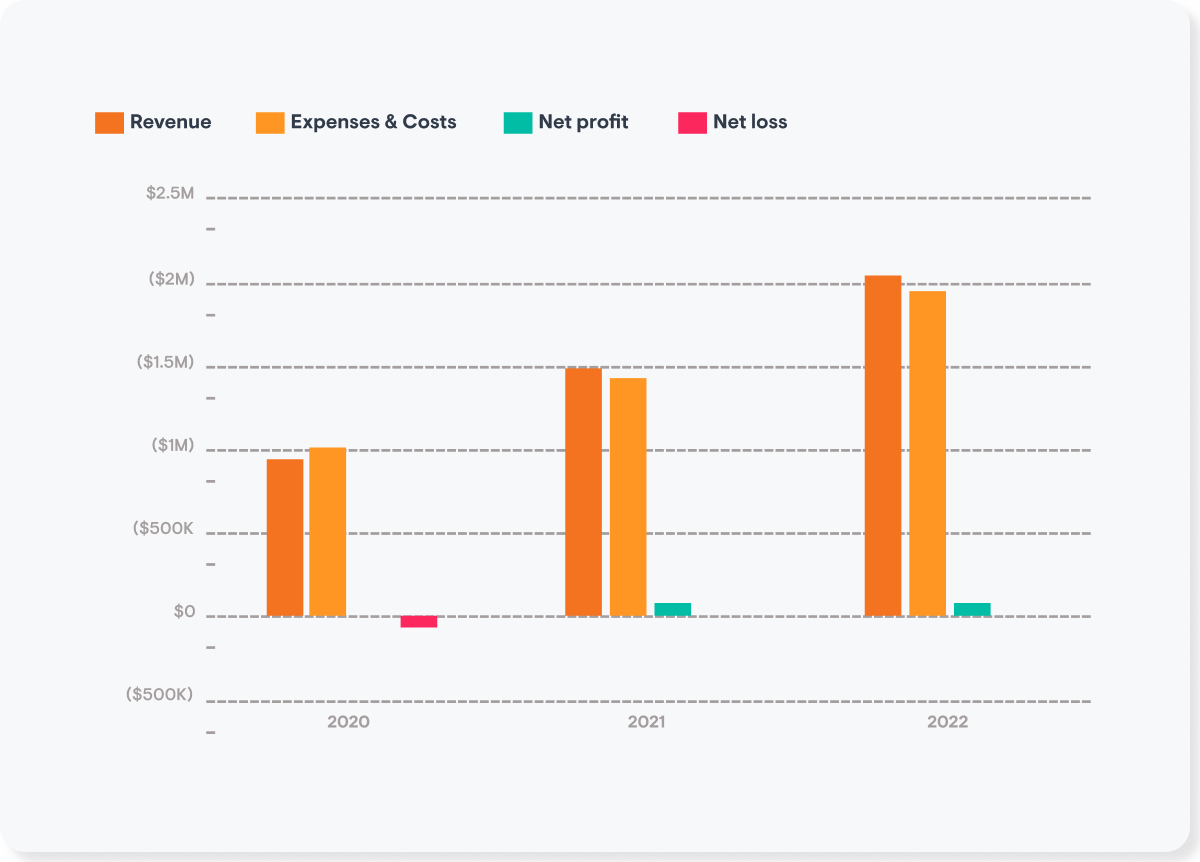How to Write a Successful Construction Business Plan (BONUS: FREE Business Plan Templates)
A business plan for your construction company should answer four key questions – What? Why? How? Who?
To be clear, there’s no “right” or “wrong” way to write a business plan and there are hundreds of business plan templates and types, so the most important feature is to write a plan that’s easy for you to use as a guide when it’s time to make major decisions.
Read on to discover how to write your own construction business plan and give your company the foundation it needs to grow year after year.
Whether you’ve been running your construction company for years, or you’re looking to launch your own business, a business plan is crucial.
Without a business plan you’re wearing a blindfold, shooting in the dark, and have no idea where the target is.
In contrast, a construction company with a business plan understands what their goals are, how to reach those goals, and how to navigate the obstacles along the way – like other businesses trying to steal your customers, or whether it’s better to lease or buy equipment.
The result? Businesses with formal business plans have a 30% greater chance of growth.
Because running a construction company – whether you build, renovate or demolish – isn’t about how skilled you are on the tools or how well you know your trade. It’s about being able to manage your team, time, finances, marketing and operations.
A construction business plan is how you do all of that, from one document.
And we’ll show you how to write one from scratch.
What is a construction business plan?
Your construction business plan is a roadmap of where you want to go, and how you plan to get there.
It’s the same logic as using blueprints to build a house, or mapping out a home renovation project step-by-step. When you have a strategy, the end goal is easier to reach.
Don’t think this has to be a 247-step document outlining every step and obstacle either. You’ve got your hands full running your construction or building company, so adding more paperwork and red tape isn’t the goal.
Instead, your business plan should include the most important info only, including bullet point lists, important projections, and your strategy to get where you want to go.
Read on for help writing your construction business plan from scratch.
Are there holes in your construction company’s foundation? Learn how to build a construction business from scratch
Why do you need a business plan for your construction company?
Why do you need a blueprint before working on a new project?
Because a roadmap of where you want to go means you can budget for costs, anticipate obstacles, manage your resources effectively, and cover your bases without leaving variables to chance.
For example, if a new project requires certain specialist equipment, are you going to lease or buy it?
By checking your business plan you can see whether that equipment would help you meet your business goals and whether it would be a valuable expense or not. But without a business plan you’d have to make a decision with ZERO clue how it will impact your company in the short, medium and long-term.
Without a business plan you might never realize what competition you’re facing, and end up operating in a market that’s too difficult to crack. Or, you could build your business around short-term thinking without a strategic goal and end up overextending your resources.
It’s a cliche, but it’s true – if you fail to plan, you plan to fail, that’s why 71% of fast-growing companies have business plans.
Construction companies with business plans are increasing their odds of success by:
- Establish an accurate revenue estimate
- Figuring out their best chance of making profit
- Apply marketing strategies to increase revenue
- Understanding start-up costs and managing budgets
- Convincing lenders and investors to fund the business
- Understand the competition and be able to compete in their space
If you’re ready to give your construction company the best chance of success, read on to learn how to write a business plan step-by-step.
Your construction business plan is also a funding tool
A business plan isn’t just to keep you on track and moving towards a goal, it’s also a valuable document that lenders and investors will want to check out if they’re thinking of funding your company.
This may not apply to you if you’re a one-man band looking to provide handyman services on the weekend, but for larger construction companies who rely on funding, a business plan is a foot in the door and a compelling argument all in one.
Your business plan is how you say “hey, we’re a company worth working with and investing in” while making a clear statement re: your value.
But that’s enough theory, let’s write your new business plan.
“What should I include in my business plan?”
The strength of a business plan comes from what you leave out as much as what you put in.
A bloated and needlessly complex business plan can be tough to follow and apply, leaving you drowning in jargon and corporate speak when you really want to know if your cash flow projections are accurate, or if you’re hitting your sales targets.
When writing your business plan, look to include the essentials:
| An Executive Summary | Company Description |
|---|---|
|
A short overview of your business plan, what it includes, and its purpose. |
Covering a short history of your business, plus the types of customers you serve. |
| Market Analysis | Services |
|
Including your industry, outlooks, competitors, target demographics and the people in your crosshairs. |
An overview of your construction services and the benefits they bring to your customers. |
| Marketing Strategy | Management |
|
How you plan to reach your business goals, and what those goals look like, inc. costs, overheads and plans. |
Covering the organizational structure of your company, inc. owners, managers, employees and external stakeholders. |
| Financial Plans | |
|
To help you understand the financial health of your business, inc. income statements, balance sheets, budgets, etc. |
|
Covering each of these stages promotes strategic and critical thinking – and lessens the chances of running into a catastrophic problem you don’t have a solution for.
Executive Summary
This is the short and sharp summary of your company – or your elevator pitch.
What is your company about and why will it be successful? Anyone reading your construction plan should see within seconds what your strengths are, what direction you’re heading in, your past achievements, and your strategic direction.
You’ll be expanding on much of the info in your executive summary, but include key details like:
|
|
ACTION STEP: Your executive summary should function as a separate document if needed, and still include all relevant info. Focus on making this section compelling and engaging. Whether you’re after funding, or looking to inspire your team, this section should light a fire in the reader. Try writing your Executive Summary last so you’ll have all the information you need.
Company Description
Your company description will follow your Executive Summary and will include outlines on your location, your company’s size, and your goals.
Don’t feel like this section has to be boring or dry, your company description is as much about who you want to be tomorrow as who you are today. Here’s a few key details you’ll want to include in this section of your construction business plan:
- Your construction company name
- Your business structure (Sole proprietorship, LLC, partnership, etc)
- Your location
- Your company history
- Your Mission Statement
- Your goals
ACTION STEP: You started your company because you’re passionate about building and construction, so let that passion show! Your excitement should jump from each word and get the reader excited. Use this section to put your lofty goals on paper, whether that’s turning over $10,000,000 a year or growing your team to 500 builders.
Market Analysis
Who are you up against?
You’ll need to have an in-depth understanding of your industry and market to know where the opportunities and threats are.
Your construction business plan will need to include the other construction companies working in your area. You can use Google to find these businesses if you’re not sure. Try searching for + and see what results come up.
Once you know who your competition are you can figure out what they are charging for projects, as this will impact your pricing structure. You’ll also need to know what your competition specializes in to figure out what makes you unique.
ACTION STEP: Explain the steps and strategies your construction company will use to compete with other construction companies in your area. Focus on your services rather than price, as you don’t want to get caught in a race to the bottom.
Services
Now you know what you’re up against, you can start to identify what services you’ll be offering and how those services will benefit your customers.
Will you be specializing in new home builds? Are you targeting commercial projects? Is your goal to be known in the budget renovation space?
Go a step beyond listing your services and look to unpack their value. What benefits will your services offer to your customers outside of price?
This section will provide the framework for how you’ll compete with similar services in your market, so if you’re one of 50 companies specializing in knockdown-rebuilds, you’ll know how to stand out. Look to include:
- Descriptions of your construction services
- Your service prices
- How your competition price those same services
- Future services you plan to offer
- What overheads are required to deliver your service, inc. logistic costs, computer technology, warehousing, etc
Finally, focus on the benefits of your services, not just the features. If you’re competing with similar services, success can come down to how you position yourself. For example, if the feature is the skill of your Project Managers, the benefit is a customer without stress and who doesn’t need to constantly micromanage the process to make sure it’s going as planned.
ACTION STEPS: Be the expert, but talk in everyday language. Your business plan should be accessible by anyone, whether it’s an Average Joe or a top-tier investor. This section should be customer-oriented, so imagine you’re having a coffee with a potential customer and they’ve asked you to describe your services and what makes them different from the competition.
Marketing Strategy
You’ve outlined everything related to your business, and done your homework to figure out where your company will make its mark, and which customers you’ll go after.
But how do you plan on getting all those new customers you’ve identified?
The marketing strategy section of your construction business plan can be used as a standalone tool to guide your marketing, so you’ll want actionable steps. The easiest way to set out your marketing strategy is to focus on the 4 P’s – Product, Promotion, Price, Place.
Here’s an example of how you’ll need to answer the 4 P’s to create a marketing strategy.
| PRODUCT | PROMOTION |
|---|---|
|
Do you have warranties? |
How will you advertise? |
| PRICE | PLACE |
|
What is your pricing strategy? |
Have you developed your website? |
ACTION STEP: Use visuals to outline the 4 P’s. A business plan can be a little dull, so take every opportunity to use graphs, tables and images. For example, if your pricing above or below industry averages? Use an eye-catching chart to show where you stand.
Management
Who’s in charge of…everything?
It doesn’t matter whether you’re a company of three or three hundred, your construction business plan needs to outline the core roles within your company, what responsibilities those roles entail, and how your business is structured in a legal sense.
Include a visual chart to show the hierarchy within your company and what is expected of each position. This will ensure any future team members you bring on can be tailored to the role to make sure they’re the right fit in terms of experience and skills.
As well as mapping out future expectations, use this section to showcase your organization’s current expertise. Add an overview of each team member’s experience and what they bring to your company.
Financial Plans
Time to look into the crystal ball and put your financial projections down on paper.
Outlining your goals and market opportunities is a start, but you need to back up that vision with data to show readers your construction company has a plan, and is working towards solid data.
If you can’t justify your goals with figures on the bottom line, your business plan is worthless. For that reason, the financial section of your business plan should cover:
- Sales Forecasts: Break your forecast into quarterly projections
- Expenses: Focus on expenses likely to remain the same, for example insurance or office rent
- Cash Flow Statement: keep track of cash in vs. cash out and budget based on your sales forecasts and expected expenses
- Profit & Loss Statement: Take the info from your sales forecasts, expenses, and cash flow statement to generate P&L Statements
- Balance Sheet: Track your assets and liabilities
ACTION STEPS: Financial forecasting is part art, part science. If you plan on using your business plan to round up investors, include a ‘best case’ and worst case’ scenario to show you’ve crunched the numbers every possible way.

Steal these FREE construction business plan templates
There’s no “right” or “wrong” way to write a business plan.
The most important feature is to make sure your plan is clear and engaging. Whether it’s to onboard a new manager, provide strategy for a new marketing campaign, or to help attract a new investor, your business plan’s goal is to share your company’s values and vision.
That means no spelling errors, no walls of eye-wateringly boring text, no buzzwords for the sake of it, and no making decisions based on “gut feeling”.
You already know that a blueprint can make any construction project simple and less stressful, so click the link below to access 500+ business plan templates.
Let’s recap how easy it is to write a construction business plan
Forget hiring a formal writer or investing your next seven weekends into online business writing courses. Now you know how to put a professional and valuable business plan together from scratch.
Writing a construction company business plan is easy if you focus on readability, include images to break up the text, and use each section as a chance to show off your value and brand.
And the sections you’ll need to add include:
|
|
Remember, you’ll need a business plan whether you’re looking to launch a new company, expand your current company, or attract funding – so don’t skip this crucial step.
But follow each step we’ve outlined here and you’ll have the ‘bigger picture’ on paper that can guide you forward. Because it’s always easier to reach your destination when you have directions, and with your completed construction business plan, you’ll be unstoppable.
Looking for help growing your construction business? Explore our Digital Marketing Services to find out how we GUARANTEE leads









